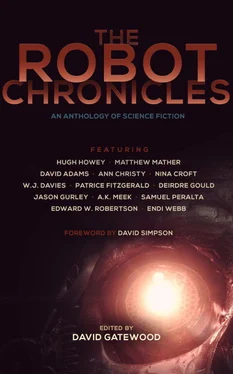I’m sorry, that sounded very unprofessional. Its art, I tell you. Aaaaahhhht . I weave delicate themes of meaning and symbolism throughout my prose, and the resulting tapestry of word-smudges on the canvas speaks to the intimate human yearning for… something.
Yeah, I just like to blow stuff up. In my writing, and in the lab.
Anyway, if you want to know when I blow up something else—er, publish something new, you should totally subscribe to my mailing list: smarturl.it/endimailinglist. Benefits include you getting all (ALL!) my short stories for free, lower prices on my new releases, and other, intangible benefits*. And come stalk me on Facebook!
Thanks for reading!
*Intangible benefits do not include anything of monetary value, and may be completely made up.
SHIMMER
by Matthew Mather
The Cognix boardof directors meeting was over, and Dr. Hal Granger glared at Patricia Killiam as she closed down the shared memetic structures of the meeting space. Dr. Granger had been right in the middle of explaining how his happiness indices were central to the entire Atopian project when Patricia had cut him off.
Such arrogance in that Patricia Killiam. What made her think she could talk about happiness? As if anyone knew more about emotions than Dr. Granger.
Patricia was always lording over everyone the idea that she was the famous “mother of synthetic beings”—but from Dr. Granger’s point of view, this just wasn’t true. Her research had focused only on generalized fluidic and crystallized measures of logical and linguistic intelligence; it was his contribution that had led to the creation of emotional and social intelligence for artificial beings.
And what was more important? What someone said—or the emotional reason behind why they said it? After all, the very definition of consciousness was how information felt when it was processed in a certain way.
Patricia really overestimated her importance in things. Who knew more about happiness than he did?
Really, what nerve.
Dr. Granger needed to calm down. An aimless wander through a few floors of the hydroponic farms ought to do the trick. He exited the boardroom and jogged down an interior staircase into the vertical farming levels just below.
The top floor of the complex belonged to the offices of Kesselring, the founder and chairman of Cognix. Even the master of synthetic reality liked to keep his specific reality positioned above everyone else’s. As he passed through the level, Dr. Granger stopped for a moment to enjoy the view of Atopia from a thousand feet up: semi–tropical forests, capped by crescents of white beaches; the frothy breakwaters beyond. Through the phase-shifted glass walls, the sea still managed to glitter under a cloudless blue sky.
As he continued down the stairs into the main grow farms, Dr. Granger took a deep breath, enjoying the humid and organic, if not earthy, smell. He loved that smell. Although, if he was being honest, what he enjoyed most about the farming complex wasn’t the smell or the peacefulness: it was the curt, respectful nods he received from the staff. That, and watching the blank faces of the psombie inmates.
Most of the psombies here were people incarcerated for crimes, their minds disconnected from their bodies while they waited out their sentences in multiverse prison worlds. In the interim, their bodies were consigned to community work in various places around Atopia, such as these farms, where they were safely guided by virtual minders. Even paradise needs correctional services.
Yes, the farms were a nice, controlled environment.
They made Dr. Granger feel powerful and safe.
“Shimmer!” he called out.
Shimmer popped into one of his display spaces and began walking in step beside him. She was a virtual creature, living in the digital hyperspaces around him, but to his eyes she appeared as a lithe twenty-something with cropped blond hair and blue eyes.
“Yes, Dr. Granger?” Shimmer replied. “Do you want me to start a new log entry on Dr. Killiam?”
He nodded, but really, she didn’t need a response. She always knew what he was thinking. She, or he. Shimmer was as evenly an androgynous creature as Dr. Granger had ever met or created. When he felt he needed a female perspective, Shimmer seemed womanly. When he felt that a stronger hand was necessary, Shimmer seemed more masculine. For a synthetic being, gender was superfluous in the biological sense, but it remained critical in others. It was Shimmer’s ability to understand the emotional dynamics of both sexes that had made her famous.
Or, rather, made me famous. Dr. Granger smiled.
“Already done, Dr. Granger.” Shimmer smiled back at him. “Do you want me to walk you home while you get some work done?”
Dr. Granger nodded. “Yes, please.”
He relaxed, letting Shimmer take control of his motor cortex and begin walking him along the corridors. He’d been unconsciously looking out the windows to the view below, but once Shimmer took charge, she shifted his gaze front and center. They turned from the outer corridor toward the interior elevators.
Dr. Granger decided to simply joyride for a while. He enjoyed these little moments, and Shimmer sensed this. She outstretched his arms and spread his fingers so that they slid through the plant leaves as they passed. Dr. Granger was easing into the back of his mind, about to shift his point of view into his workspaces, but the feeling of the plants brushing past his fingertips tingled his senses. He let his consciousness sink further and further back, relaxing his mind.
Work could wait.
Shimmer was one of the cornerstones of the entire modern field of synthetic intelligence. The idea had come to Dr. Granger as an assistant professor at Stanford, a young and ambitious man trying to work his way up through the ranks. Of course, some disgruntled grad students had tried to claim the work as their own, but Dr. Granger had held firm, through multiple lawsuits, that he was the glue that had held the thing together—despite what some said.
The experiment that had started it all was a mirror neuron simulation. A stream of human sensory data was fed through it—using real-time visual and audio input from hundreds of psychology grad students—to create an aggregate virtual body. The goal was to create a machine that didn’t just mimic emotions, but that actually learned the basis of animal emotion as the animal itself .
Early experiments bore out the concept, and over the years Dr. Granger secured the funding to build ever more elaborate networks—networks that had reached their culmination in Shimmer. Shimmer had learned the basis for emotion like a baby learning to speak a language—by watching and feeling what the human participants felt until she could feel it for herself.
In the process, she gained the superhuman ability to identify the precise combination of emotions present in a human subject—out of the thousands of possible combinations.
Earlier efforts to build tools that could identify human emotions had focused on observing the human face and bio-sensing things like skin temperature, heart rate, and pupil dilation. These methods worked well enough for the “big six” emotions that psychologists traditionally focused on: joy, sadness, anger, fear, surprise, and disgust. But what Shimmer was able to distinguish was infinitely more subtle.
She could pick out combined layers of emotions: like avarice, embarrassment, boredom, loneliness, jealousy—even the double-edged sword of pride, and the many faces of confusion. Gratitude was one of Shimmer’s specialties—an especially difficult and important emotion, as it was the building block for that most cherished of human emotions, love.
Читать дальше






![Сидней Баундс - The Robot Brains [with w_cat]](/books/196989/sidnej-baunds-the-robot-brains-with-w-cat-thumb.webp)





